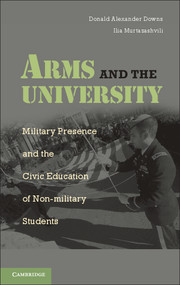14 - Conclusion
Placing the Military in the University
Published online by Cambridge University Press: 05 June 2012
Summary
The original sin stems from the pretension to be other than one’s true self. It is our privilege to try to be whatever we wish; but it is vicious to pretend to be what we are not, and to delude ourselves by growing habituated to a radically false idea of what we are. . . .
Not only does it [the university] need perpetual contact with science, on pain of atrophy, it needs contact, likewise, with public life, with historical reality, with the present, which is essentially a whole to be dealt with only in its totality, not after amputations ad usum Delphini. The university must be open to the whole reality of its time. It must be in the midst of life, and saturated with it . . .
– Jose Ortega y GassetOne of the fundamental institutional conflicts in American society concerns the relationship between arms and the university. Several questions guided our inquiry into the nature and significance of the military and military-related fields of study in the academy. What is the status of the military and military-related fields of inquiry in American universities? Does an appropriate military presence contribute to civic and liberal education? Does appropriate military presence improve prospects for national security? Can appropriate military presence within a university enhance the relationship among civil, political, and military institutions in American society?
- Type
- Chapter
- Information
- Arms and the UniversityMilitary Presence and the Civic Education of Non-Military Students, pp. 411 - 424Publisher: Cambridge University PressPrint publication year: 2012



